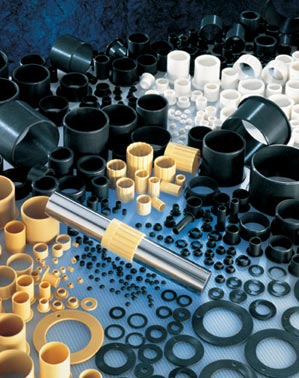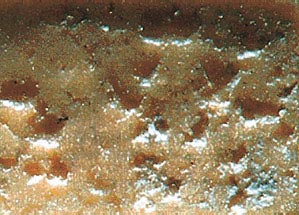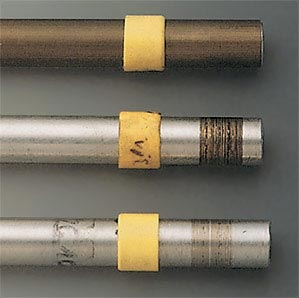What influence does the iglidur polymer bearing have on selection of the shaft?
1. Cost points of view
Cost reduction is an important factor for most companies. The possibility of using a cost-effective shaft material primarily depends on what bearing is selected.
For example, ball bearings require very hard (60HRC or higher) and smooth shafts. The same applies to bronze bearings: the shaft must be harder than the bronze material used. These requirements limit the choices regarding the shaft. An inexpensive shaft material may be unsuitable for the application or bearing.
Plastic bushings allow more options because they can be used for many different shafts. iglidur plain bearings from igus are available in a large number of different materials:
you can therefore combine the least expensive shaft with the iglidur bearing material that is most suitable for the application or the required service life. Bearing and shaft only have to last as long as the service life of the entire machine/equipment. – Why choose an expensive shaft or expensive bearing that lasts longer than the machine itself?

2. Wear aspects
Apart from the cost factors, a series of other factors have to be taken into account with regard to the interplay of shaft and bearing system. If ignored, many factors can impair the functioning of the bearings used. If the shaft is too rough, wear can become a problem. A shaft that is too rough can act like a file and particles can become detached from the surface during movement. If the shaft is too smooth, however, the friction can increase if the surfaces of shaft and bearing adhere to each other. If there is a big difference between static and dynamic friction, a stick-slip effect can occur between two surfaces that touch each other. This usually becomes apparent in the form of a loud squeaking noise.

Another important aspect is the damage that abrasive particles on bearings and shafts can cause. If particles come between the bearing and shaft, both can become worn faster. Dirt, dust, chips and paper fibres are particles that can cause increased wear. Self-lubricating bearings with embedded lubricants have a considerably longer service life in dirty environments because there is neither grease nor oil in the bearing point. This means that particles of dirt are not attracted to or remain stuck on the shaft or in the bearing (as can be observed in the case of a well-lubricated bicycle chain, for example). – This also enables the use of less expensive shafts in applications in dirty environments. On the market, there are numerous shaft materials, each of which can have a different effect on the wear of a bearing. These include aluminium, case-hardened steel, stainless steel and chrome-plated steel. In the end, the conditions of use and the service life requirements for the shaft to be used are what count. When the appropriate iglidur plain bearing is selected, any commercially available type of shaft can be used.

Hard chrome-plated shafts, for example, are very hard but also smooth. On average, the wear of iglidur plastic bearings is usually lower with this type of shaft than with other types of shaft. Due to the low surface roughness, however, a slip-stick effect can occur in isolated cases. The diverse types of stainless steel are preferably used in wet areas and food processing, whereas hard-coated aluminium is suitable for applications involving small loads and the need for weight reduction. Here, the best coefficients of friction are achieved in combination with iglidur J.
